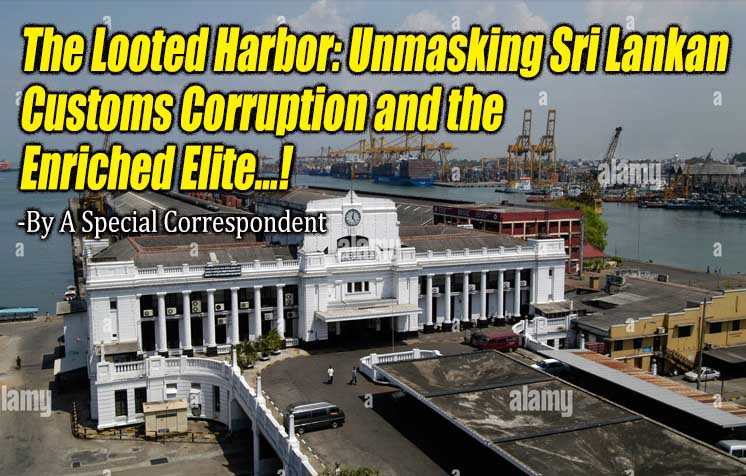-By A Special Correspondent

(Lanka-e-News -24.Jan.2024, 10.15 PM) In the bustling port of Colombo, a shadowy underworld thrives within the Customs Department, where deceit, under-valuation, and corrupt practices have not only cost the government substantial revenue but have also propelled senior officers into unimaginable wealth. This extensive investigative report aims to unravel the layers of corruption within Sri Lankan Customs, examining the under-valuation of goods, irregularities in inspections, complicity in smuggling, the shocking wealth accumulation of senior officers, and the failures of finance ministers to curb these illicit activities.
A recurring theme in the Customs Department's dark narrative is the widespread under-valuation and misclassification of goods. Importers exploit loopholes, systematically understating the value of goods or misclassifying them under lower tariff codes to pay reduced customs duties. This deceptive practice bleeds the government of revenue that could otherwise fund essential public services, welfare programs, and vital development projects.
A recent corruption diagnostic report by the International Monetary Fund (IMF) has exposed the alarming extent of corruption within Sri Lankan Customs. Shockingly, Customs officials themselves have acknowledged a "rampant state of corruption" within their institutions, highlighting the pervasive culture and the minimal risk or consequences of exposure. Critics attribute this environment of corruption to the country's high import and excise tax rates, which some argue create fertile ground for illicit practices such as the illegal manufacture of alcohol and the smuggling of cigarettes.
The lack of a standardized approach to customs inspections has given rise to systemic irregularities. Many customs officers maintain dubious relationships with wharf clerks, striking backdoor deals on how to issue importation tariff calculations. A percentage of the goods are clandestinely set aside for personal use. When containers are transferred to the Central Cargo Examination unit at Orugodawatha, senior officers reportedly show favoritism to connected business importers, facilitating quicker clearance with reduced duties.
A darker facet of corruption within Sri Lankan Customs involves the complicity of officers in smuggling illegal drugs, vehicle parts, banned items, and cigarettes. Shockingly, a customs officer has been arrested on allegations of aiding the importation of narcotics worth Rs. 60 million. This revelation raises serious questions about the integrity of those entrusted with upholding the nation's borders.
The investigative lens reveals that 85 customs officers in Sri Lanka have amassed immense wealth, owning valuable properties, luxurious vehicles, and even extending loans to businesses. The wealth accumulation is directly tied to corrupt practices, with dealings with unscrupulous importers contributing significantly to their burgeoning fortunes.
Hardworking Sri Lankan migrant workers are unjustly burdened with heavy importation duties, despite being entitled to free allowances. This disparity in treatment underscores the skewed priorities within Sri Lankan Customs, where honest individuals are penalized, and corruption flourishes.
President Ranil Wickramasinghe's tenure as Finance Minister saw a lack of progress in curbing corruption within the Customs Department. Allegations suggest that corrupt officials within the Customs Department favored the minister's close network of friends. Despite acknowledging the rampant state of corruption, very few cases have been investigated or reported in recent years, leaving the Customs Department in a state of unchecked malpractice.
As Sri Lanka grapples with vulnerabilities, the government's commitment to state sector reforms, a crucial part of the IMF agreement, becomes imperative for international credibility. The Customs Department, a critical revenue agency, demands immediate and robust reforms. A comprehensive vetting process for recruitment, enhanced oversight and accountability mechanisms, and routine integrity tests must be introduced. It is high time for a complete overhaul of Sri Lanka Customs to cleanse it from the clutches of corruption, restore public trust, and foster an environment of fairness and justice in international trade relations.
---------------------------
by (2024-01-24 17:02:55)
Leave a Reply